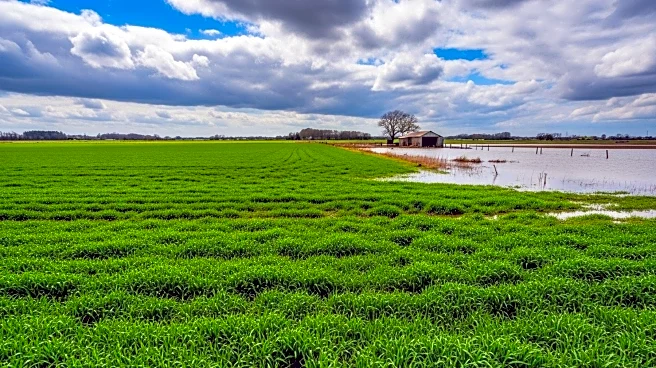What's Happening?
PPP Chairman Bilawal Bhutto-Zardari has urged the federal and provincial governments to declare an agricultural emergency in Punjab due to severe flooding. During his visit to Kasur, he met with affected farmers and discussed the extensive damage to the agriculture sector. Bhutto-Zardari proposed measures such as waiving electricity bills and delaying or writing off agricultural loans for farmers in disaster-hit areas. He also suggested cash transfers through the Benazir Income Support Programme to aid recovery. The PPP leader accused India of violating the Indus Waters Treaty by withholding flood data, exacerbating the situation.
Why It's Important?
The call for an agricultural emergency highlights the critical impact of flooding on Punjab's agriculture sector, which is vital for the region's economy. The proposed relief measures aim to alleviate the financial burden on farmers, ensuring their survival and recovery. The situation underscores the need for effective disaster management and international cooperation, particularly concerning water-sharing agreements. The floods have exposed vulnerabilities in infrastructure and emergency response, prompting discussions on improving resilience and preparedness for future disasters.
What's Next?
The federal and provincial governments are expected to respond to Bhutto-Zardari's call for an agricultural emergency, potentially implementing relief measures to support affected farmers. The situation may lead to increased collaboration between government agencies and international donors to provide financial assistance and resources. The accusation against India regarding the Indus Waters Treaty could prompt diplomatic discussions to address water-sharing issues and improve transparency. The PPP's involvement in relief efforts may influence political dynamics in the region, affecting future policy decisions.
Beyond the Headlines
The floods in Punjab raise broader questions about climate change and its impact on agriculture, emphasizing the need for sustainable practices and infrastructure improvements. The situation highlights the importance of cross-border cooperation in managing shared water resources, potentially influencing future treaty negotiations. The focus on agricultural relief underscores the socio-economic challenges faced by rural communities, prompting discussions on long-term strategies for poverty alleviation and rural development.











